World
Out in the World: LGBTQ news from Europe and Asia
Lesbian Serbian Prime Minister Ana Brnabić has stepped down

LITHUANIA
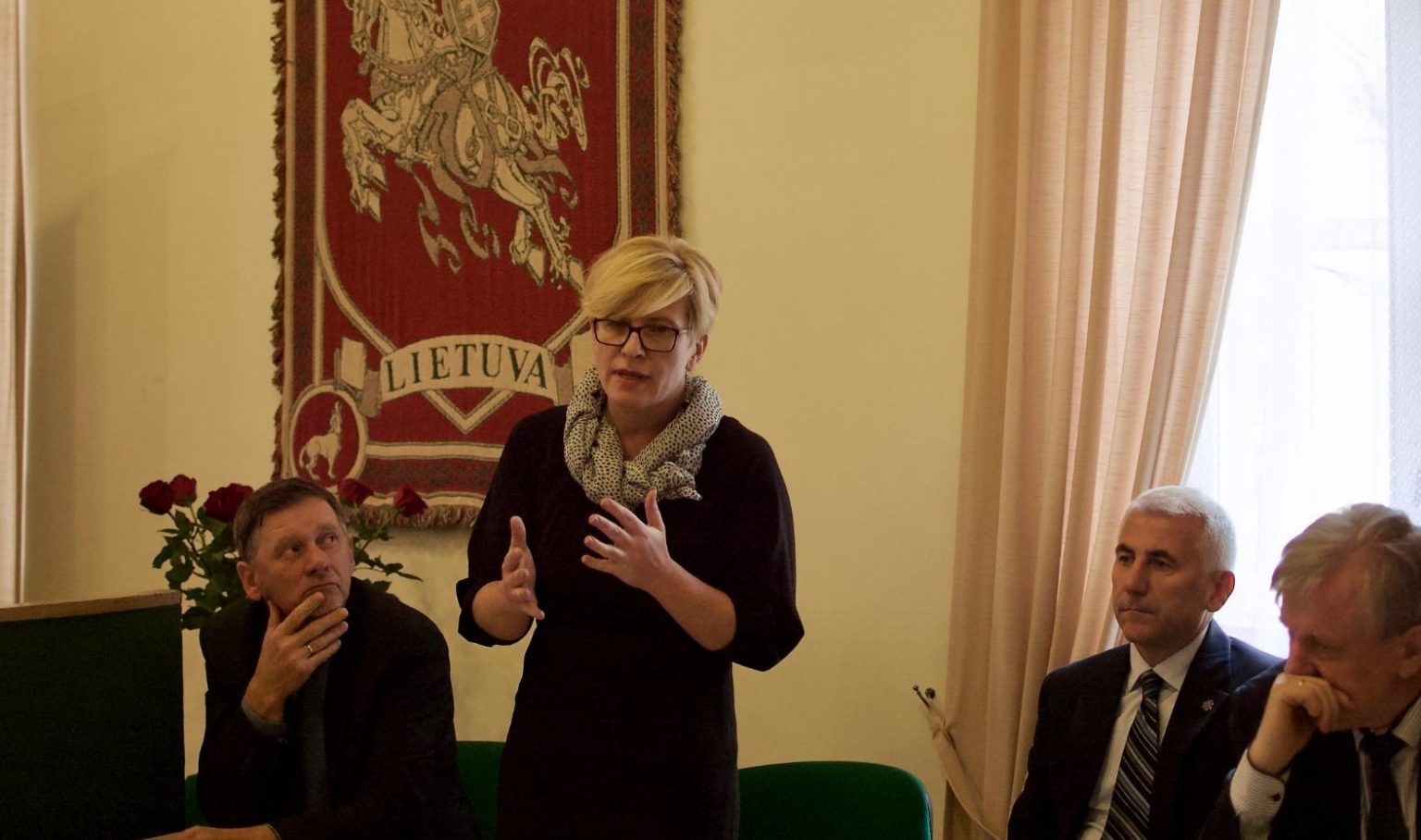
A group of same-sex couples is taking the Lithuanian government to the European Court of Human Rights, seeking access to civil unions, marriage and parental rights.
The couples involved in the suit are seeking registration of civil partnerships and recognition of same-sex marriages contracted in foreign countries. In a separate case, a same-sex couple is seeking equal parenting rights for their child. The petitioners will also be asking the Lithuanian Constitutional Court to clarify the definition of marriage in the constitution.
Lithuania does not recognize any form of same-sex relationship. A bill to legalize civil unions was proposed by the governing coalition and is one vote from passing through Parliament, but has been put on hold amid fears that it doesn’t have enough support to pass.
“The year-long litigation marathon clearly shows the reasons why trust in courts is so low in Lithuania. International law does not work in Lithuania,” Martynas Norbutas, one of the petitioners, said at a press conference.
The European Court of Human Rights is a supranational court for all members of the Council of Europe, which tries cases involving the European Convention on Human Rights. While the court has found that the convention does not require states to allow same-sex marriage, it has in the past found that same-sex couples must be grants some alternative status that is equivalent to marriage. However, it is up to individual states to implement the court’s rulings, as it has no enforcement mechanism.
Of the Council of Europe’s 46 members, 21 allow same-sex marriage, 10 allow same-sex civil unions and 15 currently have no recognition of same-sex unions.
In February, Prime Minister Ingrida Šimonytė said she was disappointed that members of her coalition had gone back on their word by failing to support the civil union law.
“I know very well that I cannot convince some of my colleagues despite the fact that the absolute majority of our factions vote for that law,” Šimonytė said on the local news program Laisvės TV.
It isn’t the first time Lithuania’s unruly coalition has failed to pass an LGBTQ rights law. Last year, the government tried to repeal an old “LGBT propaganda” law that the European Court ruled violated the convention’s right to freedom of expression, but the bill was voted down in parliament. A separate bill that would have seen Lithuania join the Council of Europe’s Istanbul Convention on Domestic Violence was also voted down after anti-LGBTQ activists began a campaign linking the convention to “gender ideology.”
Parties on both sides of the issue are attempting to shore up support ahead of parliamentary elections expected in October.
In neighboring Poland, the newly elected government says it is still planning to introduce same-sex civil unions, although it will miss its self-imposed deadline of doing so within its first 100 days. Equalities Minister Katarzyna Kotula told OKO.press that the government is still working with its coalition partners to come to agreement on what civil unions will entail, with the government preferring that same-sex couples get all the rights that come with marriage, including adoption and parenting rights.
GEORGIA
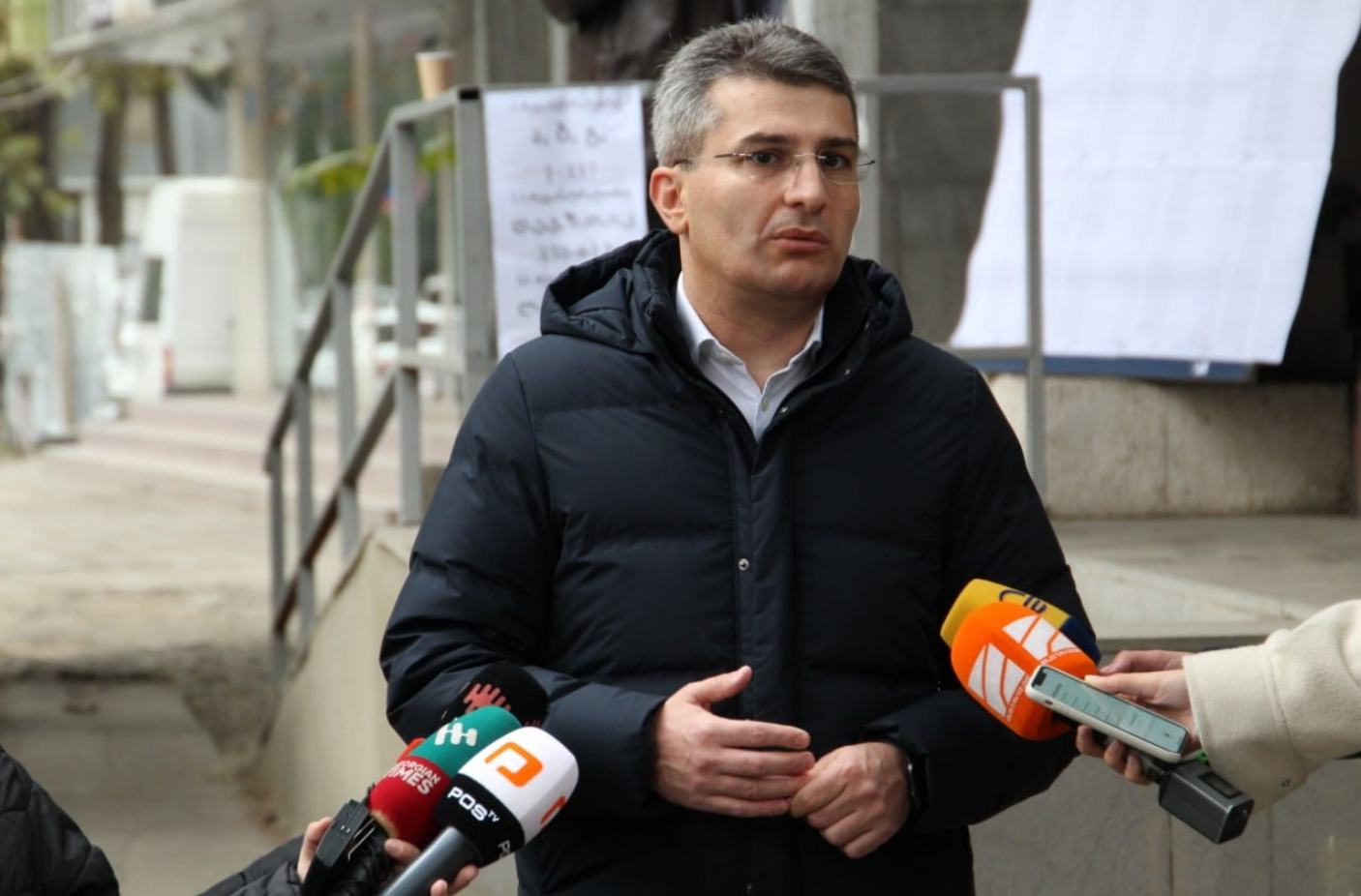
The government of the former Soviet republic of Georgia has announced plans to introduce a series of laws and constitutional amendments to limit so-called “LGBT propaganda,” ban gender change and ban adoption by LGBTQ people.
Georgia’s Parliament amended the constitution in 2017 to ban same-sex marriage. This proposal would add a new special constitutional law for the protection of family values and minors.
Under the new constitutional law, the state would be forbidden from recognizing any relationship other than heterosexual relationships, restrict adoption to married heterosexual couples and heterosexual individuals, ban any medical treatment to change a person’s gender and require that the government only recognize gender based on a person’s genetic information and ban any expression or organization promoting same-sex relationships or gender change.
Mamuka Mdinaradze, the executive secretary of the governing Georgian Dream party, says the goal of the constitutional amendments is to “protect society from pseudo-liberal ideology and its inevitable harmful consequences.”
Mdinaradze says the reforms will allow the government to block attempts by courts or international bodies to force the government to recognize same-sex marriage or civil unions.
While the Georgian government has been pursuing an alignment with the West and membership in the European Union, its government has recently taken many regressive steps on human rights and rule of law.
Last year, it introduced a “foreign agents” law that would have cracked down on media and non-governmental organizations that are critical of the government. The government backed down after massive protests.
But the conservative Georgian society appears unlikely to mobilize in massive numbers to oppose this bill, even if it does attack basic human rights.
However, as the proposed reforms would conflict with the European Union’s standards for free expression and human rights, the proposal may force Georgians to decide between repressing LGBTQ rights and its goal of EU membership.
“As an EU candidate country, Georgia is expected to align its laws with EU legislation,” the EU delegation in Georgia told German newspaper DW. “The candidate country must have achieved stability of institutions guaranteeing respect for human rights and respect for and protection of minorities.”
The Georgian Dream party seems to have introduced the bill to shore up support ahead of elections scheduled for October.
SERBIA
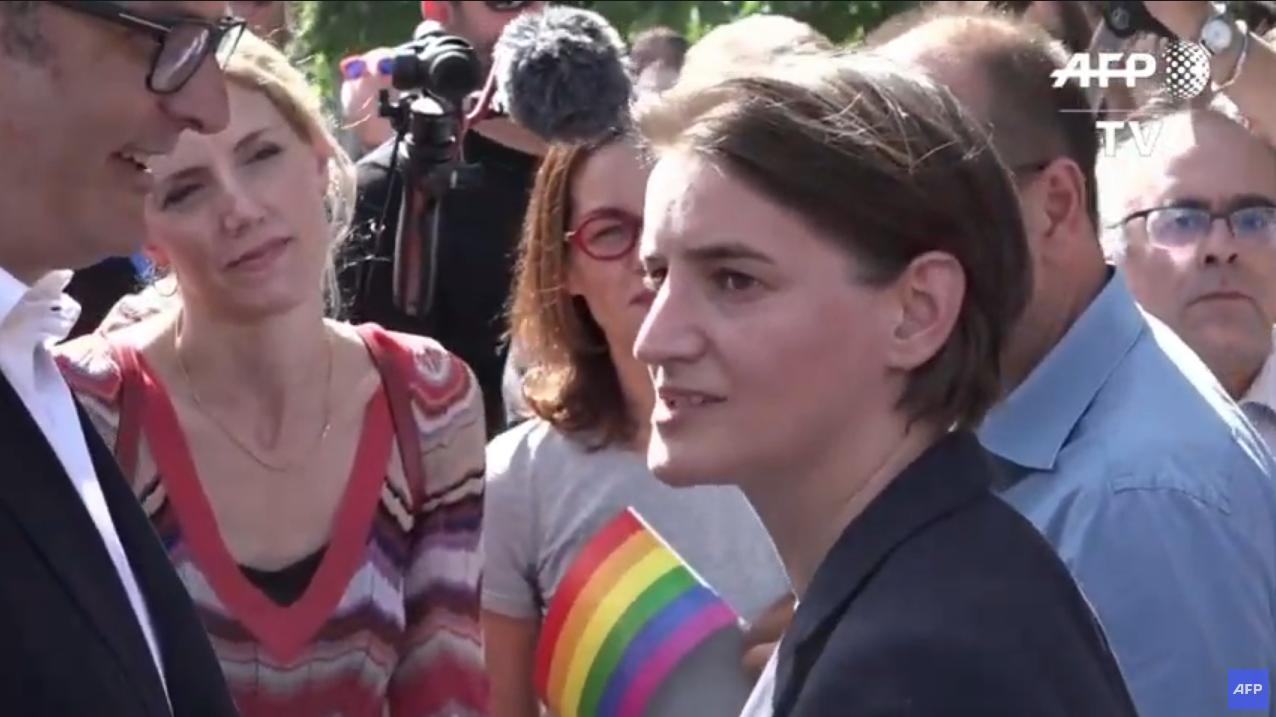
Serbian Prime Minister Ana Brnabić has stepped down after seven years in power, in a reshuffle of President Alexander Vučić’s government. Brnabić will take on the role of speaker of Parliament, while Vučić has named his ally Miloš Vučević as her successor.
Brnabić became the first woman and the first lesbian to hold the office of prime minister of Serbia, or to be a leader of any Eastern European country, in 2017. She is also the longest-serving person to have held the office.
She is still the most prominent LGBTQ person in the conservative, Eastern Orthodox country.
During her time in office, her status as a lesbian drew very little notice or criticism from Serbian society. She was the first leader of a Balkan country to attend a Pride march when she attended Belgrade Pride in 2017. She was frequently seen with her partner Milica Đurđić, who gave birth to their son in 2019.
However, despite her prominent title, it has been said that Brnabić wielded little actual power in the Serbian government, which is dominated by Vučić.
Brnabić has said that she didn’t want to be seen as the “gay prime minister” and that she prioritized policy goals other than LGBTQ rights in office. In turn, Serbia made little progress on expanding LGBTQ rights during her term.
The government introduced a civil unions bill in 2020 but shelved it months later amid backlash from legislators and a veto threat by Vučić. Beyond that, Brnabić’s government introduced a ban on discrimination against intersex people and removed regulations that barred LGBTQ people from accessing IVF or donating sperm.
During her time in office, Freedom House downgraded its classification of Serbia from “Free” to “Partly Free” due to Vučić’s increasingly authoritarian use of power and crackdowns on local media.
The government shuffle comes after December elections that were widely disputed as being rigged to favor the government. Last year, Serbia was rocked by months of nationwide protests against the government in the wake of rising gun violence, which a new opposition bloc had hoped would lead to gains in Parliament. Instead, the government won a majority.
JAPAN
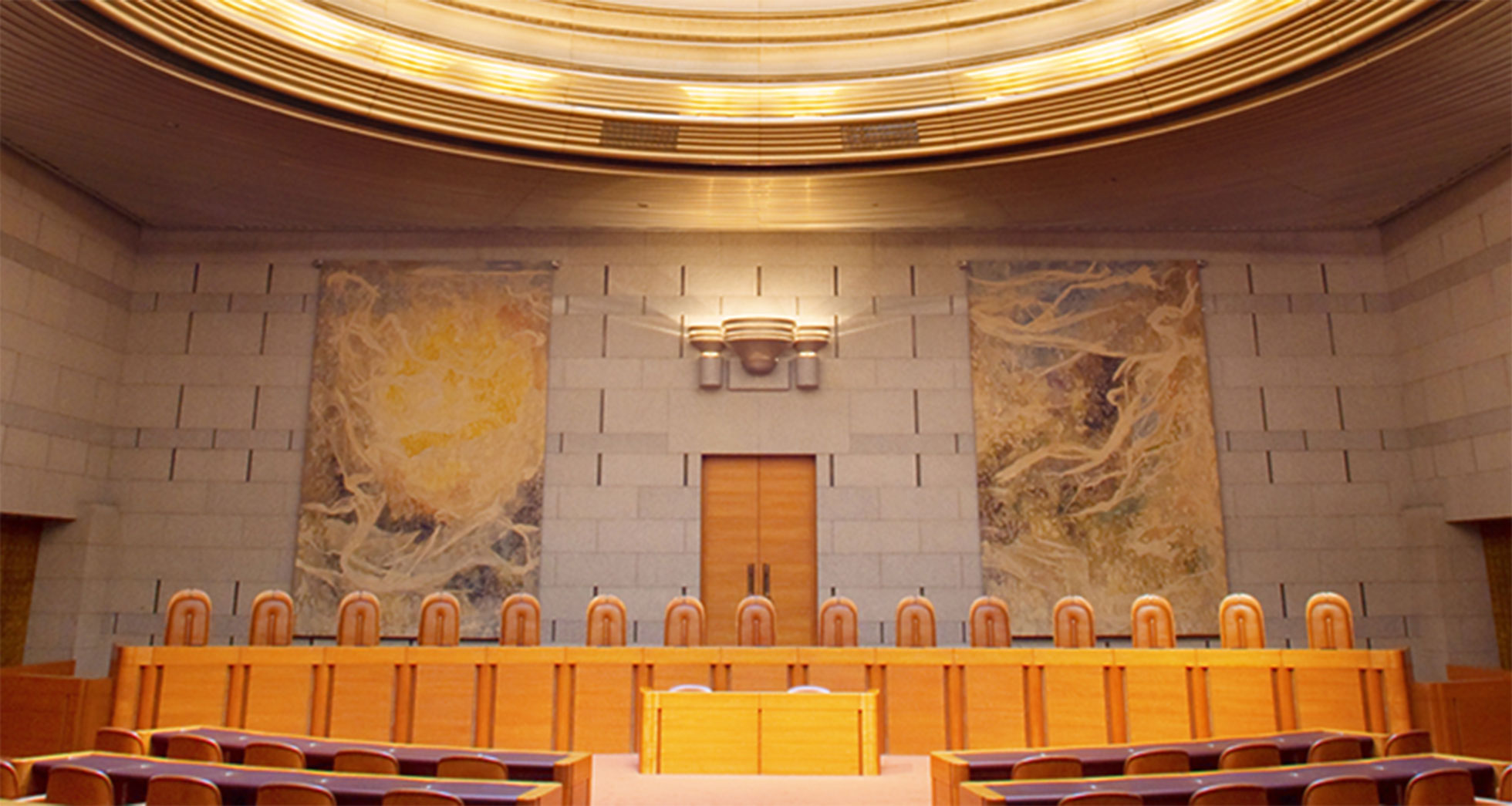
The legal battle to achieve same-sex marriage in Japan reached a new milestone, as the couples involved in a court case in Sapporo announced plans to appeal their loss to the Supreme Court, and in a separate case, the Supreme Court ruled that same-sex couples must get access to a crime victims benefit on an equal basis with married couples.
Same-sex couples have been waging a multi-front fight for same-sex marriage through the courts in Japan, given the national government’s long-standing opposition to addressing LGBTQ rights.
In March, the Sapporo High Court delivered the first appellate-level ruling on same-sex marriage, finding that the government’s refusal to allow same-sex marriage created a “state of unconstitutionality” because it discriminated against same-sex couples, but it otherwise ordered no compensation or remedy for the affected couples.
The couples have now announced they plan to appeal the decision to the Supreme Court.
One of the plaintiffs, Eri Nakaya, said at a press conference that the legal fight was essential for queer Japanese couples.
“If we back out now, legal recognition will not be achieved in the foreseeable future. I hope the Supreme Court will also declare (the same-sex marriage ban) unconstitutional,” he said.
Before the Supreme Court weighs in, more appellate court decisions are likely. District courts in Nagoya, Fukuoka and two courts in Tokyo have ruled similarly to the Sapporo court, while a district court in Osaka has upheld the ban on same-sex marriage.
But the Supreme Court may have tipped its hand in a ruling last week, which found that same-sex couples must be granted access to a benefit provided to victims of crime on the same basis as married heterosexual couples. The court came to that conclusion by reasoning that the purpose of the benefit — to help people recover after a crime — does not change depending on the gender of the victim or their partner.
While the ruling is limited to this one specific benefit, it appears likely that the same reasoning that led the court to this conclusion ought to be applicable to the constellation of benefits that are associated with marriage. Commentators have said that the same logic should apply to pensions, health insurance and family leave.
In the background of these decisions, local governments have increasingly come to recognize same-sex couples and families through legally non-binding “partnership certificates,” which are available or soon to be available in 29 of Japan’s 47 prefectures, as well as more than 400 municipalities.
Companies are also increasingly offering benefits to employees’ same-sex partners, including most recently Disney, which announced that it would provide benefits to same-sex partners of employees at Tokyo Disneyland last week.
NEW ZEALAND

In what Auckland police are treating as a hate crime, video captured three people painting over the New Zealand city’s Pride crosswalk with white paint, the latest in a brewing war over the LGBTQ Pride symbols being waged by Christian extremists in the South Pacific country.
A video of the vandals was posted to the TikTok account @aucklandcitynight00.
Auckland police say that the rainbow crosswalk on Karangahape Road in the heart of the city’s gay nightlife district was vandalized around 4 a.m. local time on March 27. Video shows three people in hooded sweatshirts and balaclavas stopping traffic to pour white paint on the road and cover the crosswalk with long paint rollers.
The vandals left the scene in a van that had its registration plates removed but police say they were able to trace the distinctively painted van’s owner and executed a search warrant on a property linked to the owner. No arrests have yet been made.
Much of the white paint had washed away due to rain and traffic, but the crosswalk still showed damage late in the day.
It was the second Pride crosswalk to be vandalized last week after a crosswalk in Gisborne, about 300 miles southwest of Auckland, was vandalized Monday morning.
The rainbow crosswalk on Gisborne’s main street had been painted over by anti-LGBTQ protesters who were upset that the local library was hosting a drag queen story hour. The next day, protesters and counter-protesters turned up at the library’s storytelling event. Then on Wednesday night, three people once again tried to paint over Gisborne’s restored rainbow crosswalk and were arrested by police who were lying in wait.
Three people have been accused of vandalism — two men aged 46 and 36, and a woman aged 45. A fourth suspect fled the scene, and police are still searching for him.
The Gisborne protesters were affiliated with the extremist Divinity Church, a Christian cult led by Brian Tamaki with around 1,700 members, according to the latest New Zealand Census. Tamaki preaches a far-right political ideology alongside anti-LGBTQ messages.
The threats have already led to drag queen story hours to be cancelled in the cities of Rotorua and Hastings, about 150 and 300 miles south of Auckland respectively. Librarians in both cities said the cancellations were made due to security concerns after the Divinity Church spread threats and misinformation about the events on social media.
He has said he intends for his church to continue protesting against town councils and libraries that host LGBTQ events and plans to continue vandalizing rainbow crosswalks, although he has denied any involvement in the Auckland crosswalk vandalism.
Tamaki has previously blamed the 2011 Christchurch earthquake on homosexuality.
AUSTRALIA
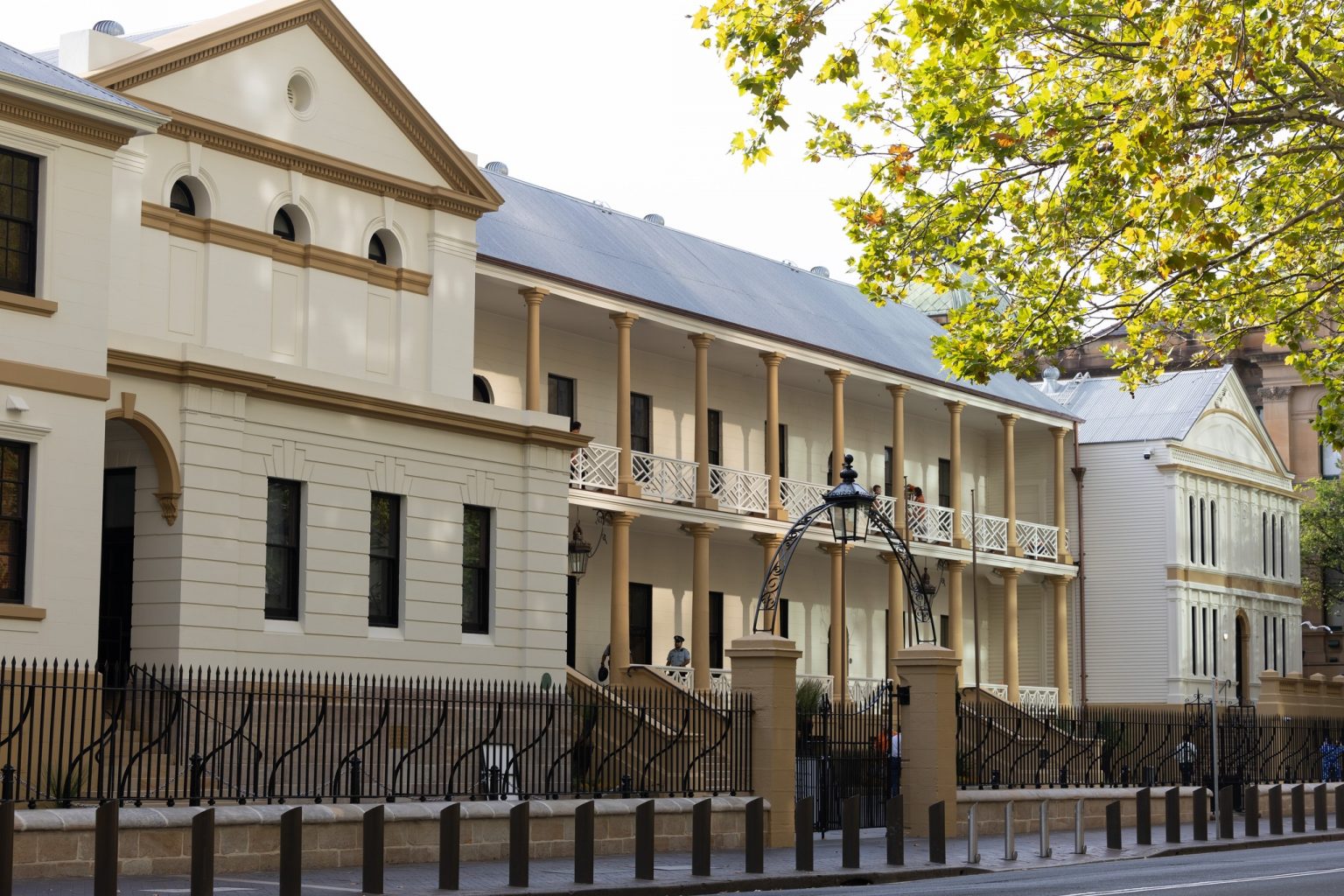
Making good on a campaign promise, New South Wales’ Parliament passed a law banning conversion therapy, making it the fourth Australian state or territory to ban the discredited practice that seeks to change people’s sexual orientation or gender identity.
The ban takes effect in one year and imposes a maximum penalty of up to five years imprisonment for any person that delivers conversion therapy that causes significant harm. The law also includes a civil complaints scheme.
New South Wales joins Queensland, Victory and the Australian Capital Territory in banning the practice. The governments of Tasmania and Western Australia have also proposed to ban conversion therapy.
“Conversion therapy proceeds on the basis that people in the LGBTQ+ community are broken, they need fixing,” says New South Wales Attorney General Michael Daley. “But we like them just the way they are.”
Worldwide, conversion therapy has been banned in 13 countries: Belgium, Canada, Cyprus, Ecuador, France, Germany, Greece, Iceland, Malta, New Zealand, Spain, Portugal and Norway. A bill to ban the practice nationwide in Mexico is awaiting a final vote in the nation’s Senate after it passed through the Chamber of Deputies last week
Colombia
Claudia López criticizes Trump over threats against Colombian president
Presidential candidate would become country’s first lesbian head of government
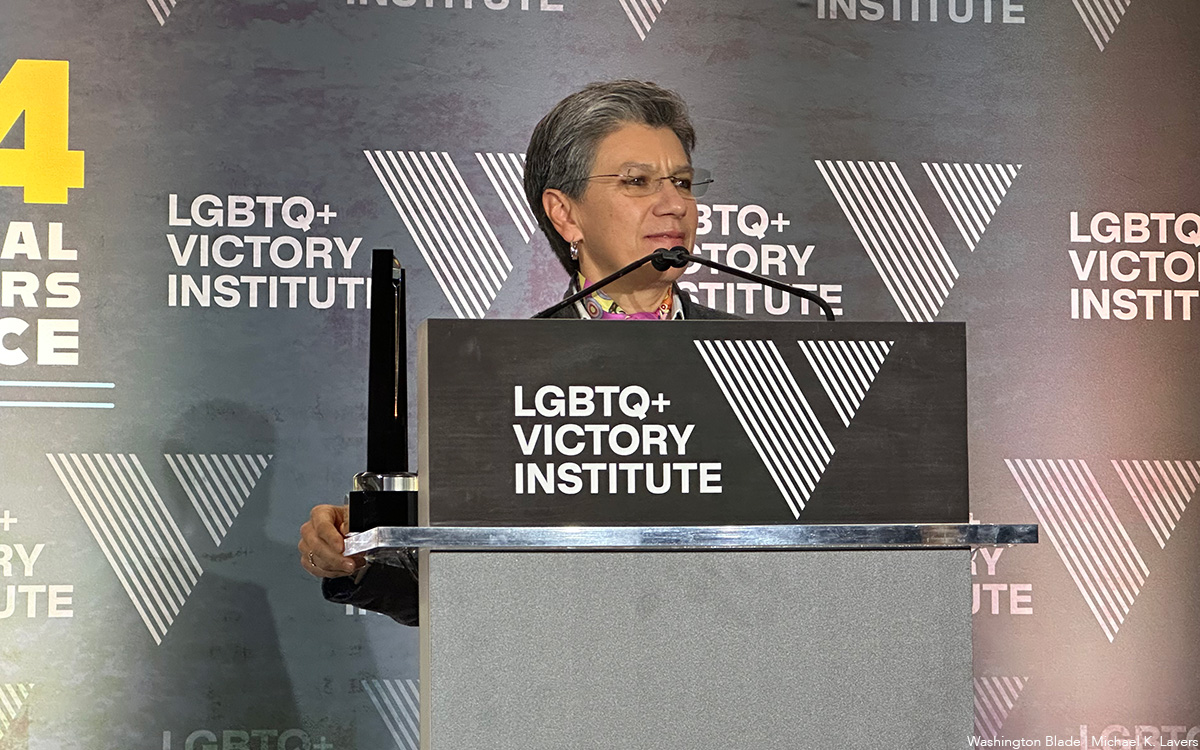
BOGOTÁ, Colombia — Colombian presidential candidate Claudia López has criticized President Donald Trump after he suggested the U.S. will target Colombian President Gustavo Petro.
“Colombia is very sick, too, run by a sick man, who likes making cocaine and selling it to the United States, and he’s not going to be doing it very long,” Trump told reporters on Air Force One on Sunday.
Trump made the comments a day after American forces carried out an overnight operation and seized now former Venezuelan President Nicolás Maduro and wife, Cilia Flores, at their home in Caracas, the Venezuelan capital.
Maduro and Flores on Monday pleaded not guilty to federal drug charges in New York.
Petro is a former Bogotá mayor and senator who was once a member of the M-19 guerrilla movement that disbanded in the 1990s. He has urged Colombians to take to the streets and “defend national sovereignty.”
“Colombians are the ones who decide who governs Colombia,” said López on her X account. “President Gustavo Petro won free elections and has a constitutional mandate.”
López did not mention Trump by name in her comment.
The first-round of Colombia’s presidential election will take place on May 31. The country’s 1991 constitution prevents Petro from seeking re-election.
López in 2019 became the first woman and first lesbian elected mayor of Bogotá, the Colombian capital and the country’s largest city. She took office on Jan. 1, 2020, less than a month after she married her wife, Colombian Sen. Angélica Lozano.
“This year we will decide at the polls what direction (the country) is heading and what leadership will advance Colombia,” said López in her X post. “Supporting soft dictatorships and attacking democracies is an absurd and unacceptable political action by the United States towards Colombia, Venezuela, and Latin America.”
Quién gobierna en Colombia lo decidimos los colombianos.
El presidente @petrogustavo ganó unas elecciones libres y tiene un mandato constitucional. Este año decidiremos en las urnas qué rumbo y a cargo de qué liderazgo avanza Colombia.
Sostener dictablandas y atacar democracias… https://t.co/K61G2QUcck— Claudia López Hernández (@ClaudiaLopez) January 5, 2026
López would be Colombia’s first female president if she wins the election. López would also become the third openly lesbian woman elected head of government — Jóhanna Sigurðardóttir was Iceland’s prime minister from 2009-2013 and Ana Brnabić was Serbia’s prime minister from 2017-2024.
The LGBTQ+ Victory Institute in 2024 honored López at its annual International LGBTQ Leaders Conference in D.C. The Washington Blade interviewed her during the gathering.
Colombia
Blade travels to Colombia after U.S. forces seize Maduro in Venezuela
Former Venezuelan president, wife seized on Saturday
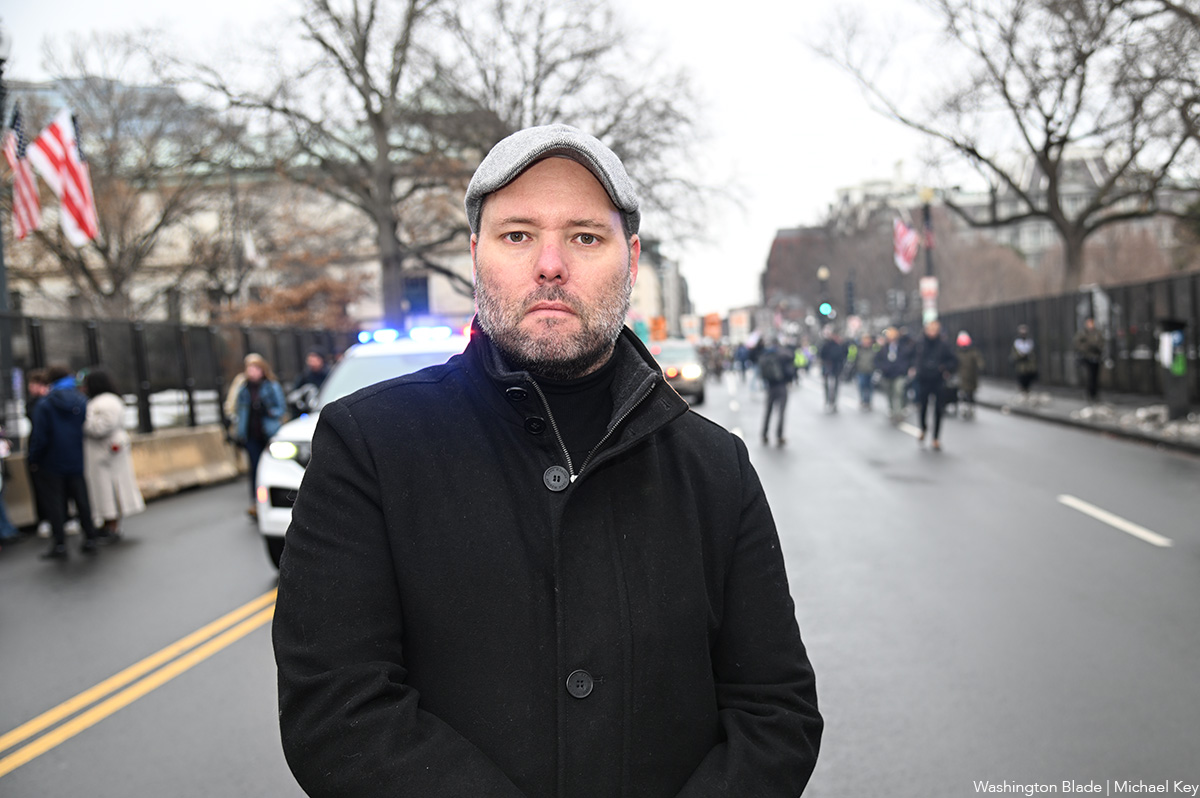
Washington Blade International News Editor Michael K. Lavers will be on assignment in Colombia through Jan. 10.
Lavers arrived in Bogotá, the Colombian capital, on Monday. American forces two days earlier carried out an overnight operation and seized now former Venezuelan President Nicolás Maduro and wife, Cilia Flores, at their home in Caracas, the Venezuelan capital.
Maduro and Flores on Monday pled not guilty to federal drug charges in New York.
Maduro in 2013 became Venezuela’s president after his predecessor, Hugo Chávez, died.
The country’s ongoing economic and political crises have prompted millions of Venezuelans to flee to neighboring Colombia and other countries throughout Latin America and around the world. The seizure of Maduro and Flores threatens to further destabilize Venezuela and the broader region.
The Washington Blade, which has reported from Colombia several times over the last decade, has interviewed several LGBTQ Venezuelan opposition leaders. The Blade has also extensively covered the plight of LGBTQ Venezuelans and Venezuelans with HIV/AIDS who have left their country because of violence, persecution, discrimination, and a lack of medications.
“LGBTQ Venezuelans in Colombia and elsewhere have a unique perspective on the events that have transpired in their homeland over the last two days, and how they continue to reverberate throughout the hemisphere,” said Lavers. “It is critically important for the Washington Blade to document the situation in the region as it continues to evolve and to show how it will impact LGBTQ communities.”
“The Blade has a long history of covering the plight of LGBTQ communities around the world and this trip reflects our commitment to the region,” said Blade Editor Kevin Naff. “This reporting will help shine a light on the challenges facing LGBTQ Venezuelans and those living with HIV and how they are coping with the unfolding events.”
Lavers last reported from Colombia in 2021. His coverage included a trip to Cúcuta, a Colombian city that is on the country’s border with Venezuela.
World
Top 10 international LGBTQ news stories of 2025
Marriage progress in Europe; trans travel advisories depress WorldPride attendance
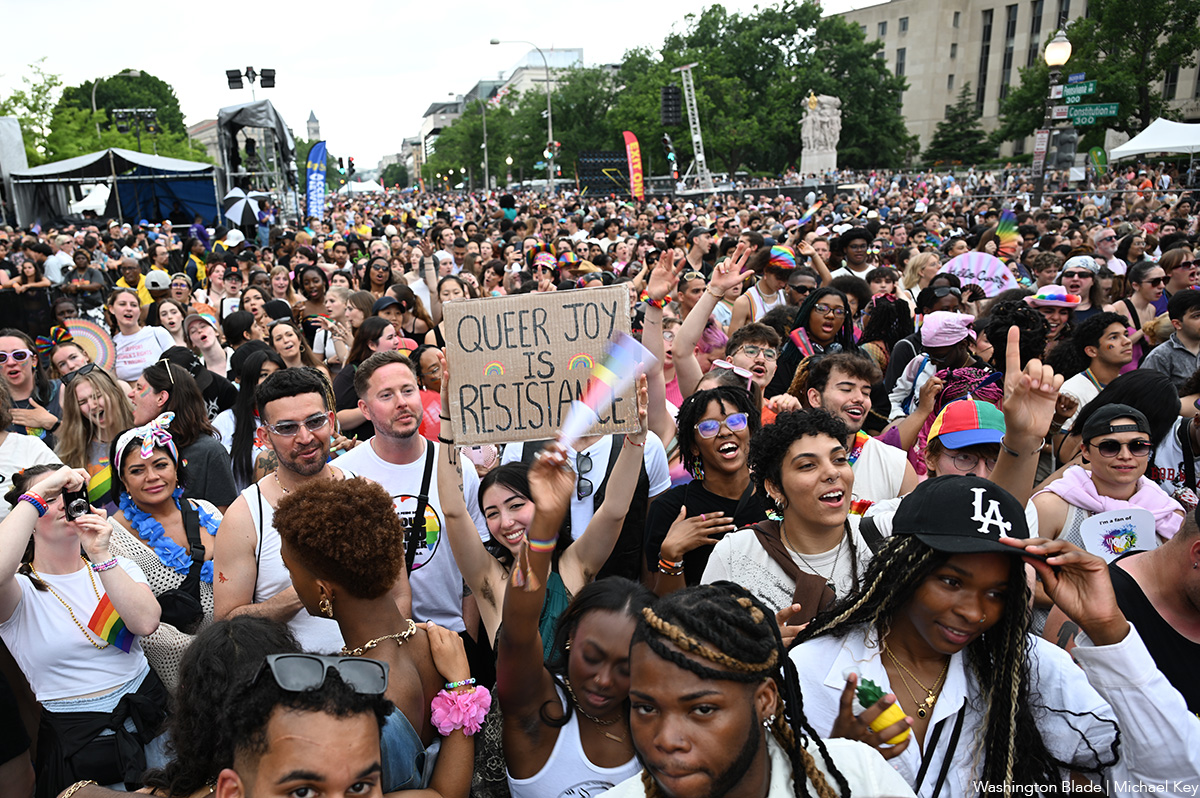
The Trump-Vance administration and its policies had a significant impact on the global LGBTQ rights movement in 2025. War, anti-LGBTQ crackdowns, protests, and legal advances are among the other issues that made headlines around the world over the past year.
Here are the top international stories of 2025.
10. Australia ends ban on LGBTQ blood donors
Australia on July 14 ended its ban on sexually active LGBTQ people from donating blood.
“Lifeblood (the Australian Red Cross Blood Service) has been working to make blood and plasma donation more inclusive and accessible to as many people as possible, whilst maintaining the safety of the blood supply,” said the Australian Red Cross Blood Service in a press release that announced the new policy.
Lifeblood Chief Medical Officer Jo Pink said the new policy will allow 24,000 additional people to donate blood each year.
9. Kenyan judge rules gov’t must legally recognize trans people
A Kenyan judge on Aug. 20 ruled his country’s government must legally recognize transgender people and ensure their constitutional rights are protected.
Justice Reuben Nyakundi of the Eldoret High Court in western Kenya ruled in favor of a trans athlete who was arrested in 2019 and forced to undergo a medical examination to determine her gender. The 34-year-old plaintiff who is a board member of Jinsiangu, a trans rights organization, said authorities arrested her at a health facility after they claimed she impersonated a woman.
“This is the first time a Kenyan court has explicitly ordered the state to create legislation on transgender rights, and a first in the African continent,” noted Jinsiangu in a statement. “If implemented, it could address decades of legal invisibility and discrimination faced by transgender persons by establishing clear legal recognition of gender identity, protection against discrimination in employment, housing, healthcare, and education, and access to public services without bias or harassment.”
8. U.S. withdraws from UN LGBTI Core Group
The U.S. in 2025 withdrew from the U.N. LGBTI Core Group, a group of U.N. member states that have pledged to support LGBTQ and intersex rights.
A source told the Washington Blade the U.S. withdrew from the Core Group on Feb. 14. A State Department spokesperson later confirmed the withdrawal.
“In line with the president’s recent executive orders, we have withdrawn from the U.N. LGBTI Core Group,” said the spokesperson.
7. Wars in Gaza, Ukraine continue to make headlines
Israeli airstrikes against Iran prompted authorities in Tel Aviv to cancel the city’s annual Pride parade that was scheduled to take place on June 13.
The airstrikes prompted Iran to attack Israel with drones and missiles. One of them destroyed Mash Central, a gay bar that was located a few blocks from the U.S. Embassy in Tel Aviv. Marty Rouse, a longtime activist who lives in Maryland, was in Israel with the Jewish Federations of North America when the war began. He and his group left the country on June 15.
Bet Mishpachah, an LGBTQ synagogue in D.C., welcomed the tenuous ceasefire between Israel and Hamas that took effect on Oct. 10, roughly two years after Hamas militants killed upwards of 1,200 people and kidnapped more than 200 others when they launched a surprise attack on the country.
In Ukraine, meanwhile, the war that Russia launched in 2022 drags on.
6. Int’l Criminal Court issues arrest warrants for Taliban leaders
The International Criminal Court on July 8 issued arrest warrants for two top Taliban officials accused of targeting LGBTQ people, women, and others who defy the group’s strict gender norms.
The warrants are for Hibatullah Akhundzada, the Taliban’s supreme leader, and Afghanistan Chief Justice Abdul Hakim Haqqani.
Karim Khan, the ICC’s chief prosecutor, in January announced a request for warrants against Taliban officials over their treatment of women and other groups since they regained control of Afghanistan in 2021. The request marked the first time the court specifically named LGBTQ people as victims in a gender persecution case before it.
5. Hundreds of thousands defy Budapest Pride ban
More than 100,000 people on June 28 defied the Hungarian government’s ban on public LGBTQ events and participated in the 30th annual Budapest Pride parade.
Former Irish Prime Minister Leo Varadkar, who is his country’s first openly gay head of government, and openly gay MEP Krzysztof Śmiszek, who was previously Poland’s deputy justice minister, are among those who participated in the march.
Hungarian Prime Minister Viktor Orbán and his Fidesz-KDNP coalition government have faced widespread criticism over its anti-LGBTQ crackdown.
Hungarian lawmakers in March passed a bill that bans Pride events and allow authorities to use facial recognition technology to identify those who participate in them. MPs in April amended the Hungarian constitution to ban public LGBTQ events.
4. LGBTQ delegation travels to Vatican to meet Pope Leo after Francis dies
Pope Francis died on April 21.
The Vatican’s tone on LGBTQ and intersex issues softened under the Argentine-born pope’s papacy, even though church teachings on homosexuality and gender identity did not change.
The College of Cardinals on May 8 chose Pope Leo XVI, an American cardinal from Chicago who was bishop of the Diocese of Chiclayo in Peru from 2015-2023, to succeed Francis.
Leo on Sept. 1 met with the Rev. James Martin, a Jesuit priest who founded Outreach, a ministry for LGBTQ Catholics. A gay couple from D.C. — Jim Sweeney and the Rev. Jason Carson Wilson — are among those who took part in an LGBTQ pilgrimage to the Vatican a few days later that coincided with the church’s year-long Jubilee that began last Christmas Eve when Francis opened the Holy Door.
3. EU’s top court rules states must recognize same-sex marriages
The European Union’s top court on Nov. 25 ruled member states must recognize same-sex marriages legally performed in other member states.
The EU Court of Justice in Luxembourg ruled in favor of a couple who challenged Poland’s refusal to recognize their German marriage.
The couple who lives in Poland brought their case to Polish courts. The Polish Supreme Administrative Court referred it to the EU Court of Justice.
“Today’s ruling of the Court of Justice of the EU is of key importance not only for the couple involved in the case, but also for the entire LGBT+ community in Poland,” said the Campaign Against Homophobia, a Polish LGBTQ and intersex rights group.
2. U.S. funding cuts devastate global LGBTQ community
The Trump-Vance administration’s decision to cut U.S. foreign aid spending in 2025 has had a devastating impact on the global LGBTQ rights movement.
Council for Global Equality Chair Mark Bromley noted to the Blade the U.S. historically funded roughly a third of the global LGBTQ rights movement.
Groups around the world — including those that worked with people with HIV/AIDS — that received U.S. funding had to curtail programming or close altogether. LGBTQ+ Victory Institute President Elliot Imse earlier this year noted the global LGBTQ rights movement in 2025 was set to lose more than $50 million.
“It is a catastrophe,” he said.
1. Countries boycott WorldPride amid travel advisories
Canada and a number of European countries in 2025 issued travel advisories for trans and nonbinary people who planned to visit the U.S.
The advisory the Danish government issued notes President Donald Trump’s executive order that bans the State Department from issuing passports with “X” gender markers. It also notes “two gender designations to choose from: male or female” when applying for an ESTA (Electronic System for Travel Authorization) or visa for the U.S.
Egale Canada, one of Canada’s largest LGBTQ advocacy organizations, in February announced its members would not attend WorldPride, which took place in D.C. from May 17-June 8, or other events in the U.S. because of the Trump-Vance administration’s policies. Other advocacy groups and activists also did not travel to the U.S. for WorldPride.
InterPride, which coordinates WorldPride, also issued its own travel advisory for trans and nonbinary people.




















